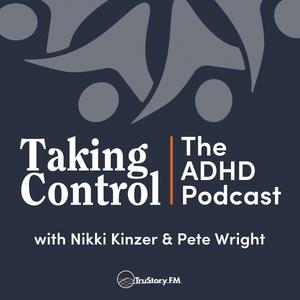
Taking Control: The ADHD Podcast
TruStory FM
Nikki Kinzer and Pete Wright offer support, life management strategies, and time and technology tips, dedicated to anyone looking to take control while living with ADHD..
- 25 minutes 34 secondsCelebrating What We Do
GPS is Now Open! Visit https://takecontroladhd.com/gps to learn more and take control of your planning today!
What if, instead of chasing perfection, we celebrated progress? What if the courage it takes to live with ADHD wasn’t just acknowledged but honored? This week on The ADHD Podcast, Nikki Kinzer and Pete Wright (Nikki and Pete) challenge us to pause, reflect, and rewrite the stories we tell ourselves. This isn’t about doing more or trying harder—it’s about recognizing the monumental effort ADHDers put into simply existing in a world that often misunderstands them.
Here’s the truth: ADHD is not a character flaw. It’s not your fault. It’s real, complex, and challenging. Yet, too often, those with ADHD dismiss their victories, minimize their strengths, and shoulder blame that isn’t theirs. Nikki and Pete remind us that this cycle of self-criticism—those loud should statements and limiting beliefs—isn’t helping.
Living with ADHD takes courage, adaptability, and resilience. But ADHDers rarely give themselves credit for what they do accomplish. This episode is a rallying cry to celebrate just that—everything you’ve already done, no matter how small it seems.
Because:
- Progress, not perfection, is what matters.
- Resting counts.
- Lowering expectations isn’t giving up—it’s being realistic and kind.
- Asking for help shows wisdom, not weakness.
And above all, ADHD is something you have, not who you are.
This isn’t about celebrating accomplishments. It’s about rejecting perfectionism, reframing expectations, and creating a mindset that allows you to thrive. ADHD doesn’t define you, but it does shape how you live—and that’s something to honor.
So pause. Recognize your efforts. Celebrate what you do. You’ve got this.
Links & Notes- (00:00) - Welcome to Taking Control: The ADHD Podcast
- (03:44) - Celebrating What We Do
16 January 2025, 11:00 am - 25 minutes 16 secondsBreak out of the ADHD Try-Hard Trap
GPS is Now Open! Visit https://takecontroladhd.com/gps to learn more and take control of your planning today!
In episode 3001, Nikki and Pete embark on a journey into the heart of the "try-hard trap." It's a familiar snare, isn't it? That relentless, gnawing feeling that we're not doing enough, that we should be doing more. That we're perpetually falling short of some invisible, yet omnipresent, standard.
Pete and Nikki explore the insidious ways in which societal pressures, internalized expectations, and the ever-present lure of FOMO (fear of missing out) conspire to keep us perpetually spinning on the hamster wheel of "trying harder." But what if, just what if, the key to unlocking our potential lies not in more effort, but in less? What if, as Pete suggests, true progress comes from letting go of the illusion of control, the unattainable ideal of perfection, and the corrosive power of self-criticism?
This isn't about surrendering to inertia, sinking into the couch, and embracing a life of indolence. Far from it. It's about recognizing the inherent limitations of our ADHD brains, and working with them, not against them. It's about embracing "good enough" as a legitimate, even laudable, achievement. It's about finding a sustainable pace, setting realistic expectations, and celebrating the small victories along the way.
Nikki offers practical strategies for navigating the try-hard trap. She emphasizes the importance of self-awareness, understanding our individual energy rhythms, and communicating our needs to others. It's about recognizing that disappointing people is sometimes necessary, even healthy. It's about prioritizing self-care, setting boundaries, and recognizing that we are ultimately responsible for our own well-being.
Links & Notes- Buy the Book! Unapologetically ADHD is Available Now
- Find us on Bluesky! @TakeControlADHD • @PeteWright • @NKinzer
- Support the Show on Patreon
- Dig into the podcast Shownotes Database
- (00:00) - Welcome to Taking Control: The ADHD Podcast
- (06:01) - The ADHD Try-Hard Trap
- (14:58) - What We Mean by Letting Go
9 January 2025, 11:00 am - 31 minutes 29 secondsIt’s Declutter Season!
GPS is Now Open! Visit https://takecontroladhd.com/gps to learn more and take control of your planning today!
Clutter. It's the silent scream of the modern age. A creeping accumulation of stuff that somehow, insidiously, steals not just our physical space, but our mental bandwidth, too. We’re drowning in it, folks. Drowning in a sea of forgotten birthday presents, impulse buys gathering dust, and that project – that project – we swore we’d finish… someday. Sound familiar? It should. Because this isn’t just about messy desks and overflowing closets. This is about cognitive overload, the subtle but persistent drain on our executive functions that leaves us feeling scattered, overwhelmed, and perpetually behind.
On this episode of Taking Control: The ADHD Podcast, Nikki and Pete dive headfirst into decluttering, exploring the peculiar relationship between our stuff and our sanity. They unpack the surprising statistics – the sheer volume of possessions we rarely use, the days of our lives lost searching for misplaced keys – and dissect the emotional baggage that comes with letting go. It’s a struggle many of us know all too well: the guilt, the shame, the nagging feeling that we should be more organized.
Think of this episode as a cognitive cleanse, a much-needed decluttering of your mental attic. It's a conversation that will resonate with anyone who has ever felt the weight of their possessions, the insidious creep of clutter, and the liberating potential of a clean slate. Join Nikki and Pete as they navigate the messy, often emotional, but ultimately rewarding journey of taking control of your space, your time, and your mind.
When you’re ready, join us for the 2025 Declutter Challenge!
Links & Notes
- (00:00) - Welcome to Taking Control: The ADHD Podcast
- (02:59) - Discord! Patreon! More ADHD Fun!
- (04:18) - It's Decluttering Season!
12 December 2024, 11:00 am - 41 minutes 8 secondsOvercoming Burnout and ADHD with David Greenwood
GPS is Now Open! Visit https://takecontroladhd.com/gps to learn more and take control of your planning today!
David Greenwood is decoding burnout. In his exploration of this pervasive modern malaise, he's ventured into the very trenches of exhaustion, spoken with those who have stared into the abyss of depleted energy, and conferred with the experts who chart the treacherous landscape of chronic stress.
This week on the show, David sits down with Nikki and Pete to discuss the often-overlooked connection between ADHD and burnout. They explore the surprising statistic that suggests a staggering disparity: up to 93% of adults with ADHD grapple with burnout symptoms, compared to a mere 30% of the general population. What accounts for this chasm? Is it the relentless pursuit of perfection, the constant struggle for self-regulation, or the insidious creep of executive dysfunction that leaves one perpetually playing catch-up?
Together, they dissect the nuanced symptoms of burnout, moving beyond the simplistic notion of mere tiredness. They explore the physical manifestations, the emotional toll, and the mental exhaustion that can leave one feeling utterly depleted. They discuss how the very nature of ADHD, with its challenges in time management, emotional regulation, and sustained focus, can create a perfect storm for burnout to flourish.
David shares his unique perspective, honed through years of experience, offering practical strategies for recognizing the early warning signs and reclaiming control. He emphasizes the importance of distinguishing between stress and burnout, highlighting the critical need to address the root causes of chronic stress before it escalates into full-blown burnout. He introduces a deceptively simple yet profound tool for self-assessment: What are you complaining about? This seemingly innocuous question, he argues, can unlock a deeper understanding of the stressors that are silently chipping away at our well-being.
Join Nikki, Pete, and David for a conversation that is as insightful as it is practical, as thought-provoking as it is empowering. They offer a roadmap for navigating the complexities of burnout, providing the tools to reclaim energy, focus, and lives.
Links and Notes
- Overcoming Distractions Podcast
- Overcoming Burnout by David Greenwood
- The Body Keeps the Score by Bessel van der Kolk
- (00:00) - Welcome to Taking Control: The ADHD Podcast
- (01:32) - Support the Show • Become a Patron at Patreon.com/theadhdpodcast
- (02:38) - Introducing David Greenwood
- (03:58) - Exploring Burnout
- (38:40) - Learn More
5 December 2024, 11:00 am - 37 minutes 36 secondsDitching the Default: Designing a Life You Love with Kate House
GPS is Now Open! Visit https://takecontroladhd.com/gps to learn more and take control of your planning today!
Have you ever felt like you were living someone else's life? That the carefully constructed path you were on, the one paved with good grades, the "right" job, the societal expectations… it wasn't yours? Kate House did. At 25, she had what she calls a "quarter-life crisis." And what she discovered on the other side of that existential meltdown might just change how you think about living with intention.
Nikki and Pete sit down with Kate, a behavior change specialist and empowerment coach, to dissect the difference between living by default and living by design. It's a conversation that resonates deeply, particularly for those of us with ADHD, whose brains often feel wired for the former. Kate's story is one of transformation, from burnt-out corporate drone to energized entrepreneur, fueled by a simple question: "What's the next right step?"
This isn't about meticulously plotting out the next decade of your life. It's about recognizing the power of small actions, the ripple effect of tiny choices that can shift your trajectory from a life of quiet desperation to one filled with purpose and, dare we say it, sparkle. It's a human story, a universal struggle to break free from the inertia of expectation and embrace the messy, beautiful journey of self-discovery.
Kate shares her wisdom gleaned from hosting the Live by Design Podcast, where she explores these very themes with her own community. She helps high-achieving women reclaim their time and energy, setting goals with soul and building sustainable habits. If you're ready to ditch the default and design a life you truly love, this conversation is a must-listen.
Join Nikki, Pete, and Kate for a conversation that will leave you questioning your own defaults and inspire you to take control of the narrative, one small step at a time. Because sometimes, the smallest shift can unlock the greatest transformation.
Links:
- (00:00) - Welcome to Taking Control: The ADHD Podcast
- (02:28) - Support the Show: Become a Patron at Patreon.com/theadhdpodcast
- (04:00) - Introducing Kate House
- (04:42) - The Role of the Empowerment Coach
- (11:06) - Sidebar: Gendered Conversations
- (14:52) - Living By Design
- (32:41) - Goals with Soul
28 November 2024, 11:00 am - 43 minutes 46 seconds2024 ADHD Conference Recap: Community & Connection
GPS is Now Open! Visit https://takecontroladhd.com/gps to learn more and take control of your planning today!
Burnout, frazzled nerves, and the daunting task of remembering the future: sound familiar? Join Nikki and Pete, your ADHD Sherpas, as they recap their experience at the 2024 International Conference on ADHD, armed with insights, new strategies, and a touch of the conference crud.
Pete, a conference newbie, marvels at the instant connection with "his people," recounting chance encounters that blossom into deep dives on everything from queer issues to ADHD. It's a fishbowl, but one brimming with empathy. Nikki, a conference veteran, shares stories of attendees finding solace and validation, highlighting the power of shared experience.
This isn't just a recap; it's a toolkit! Nikki unpacks Tamra Rosier's wisdom on the ADHD nervous system, that high-strung racehorse veering between hyperarousal and shutdown. Discover strategies to regain control, from the five-four-three-two-one grounding technique to the surprisingly soothing "head hug." They even explore the intriguing world of EFT for anxiety relief.
And there's more! Pete explores ADHD-friendly personal finance and the SAVER model offers a path to financial sanity, emphasizing streamlined systems and, crucially, engagement.
So, grab your tissues (allergies, we promise), and join Nikki and Pete for a conversation that we hope is both insightful and relatable. It's a reminder that even amidst the chaos, there's a community that gets it.
Links & Notes
- (00:00) - Welcome to Taking Control: The ADHD Podcast
- (03:08) - 2024 International Conference on ADHD
- (08:16) - Session Run-Through
21 November 2024, 11:00 am - 37 minutes 54 secondsADHD Time Warp: 2017 Insights & 2024 Previews
GPS is Now Open! Visit https://takecontroladhd.com/gps to learn more and take control of your planning today!
Envision this: Anaheim, the land of Mickey Mouse, transformed into a buzzing hive of ADHD discourse. Pete and Nikki, our intrepid podcasting duo, are on the ground, soaking up the wisdom at the 2024 International Conference on ADHD. But before they regale us with cutting-edge insights, they've unearthed a time capsule – a 2017 episode recorded post-Nikki's return from the Atlanta conference.
Now, you might think, "2017? Ancient history!" But hold on. This isn't just nostalgia. It's an archaeological dig into the evolving understanding of ADHD. Remember, intellectual progress isn't a smooth upward trajectory. It's a messy, fascinating jumble of breakthroughs and backtracks.
So, join Pete and Nikki as they rewind the clock. Nikki, fresh off her Atlanta adventure, unpacks her five key takeaways. But here's the thing: this isn't just about revisiting the past. It's about understanding how far we've come. How have our perspectives shifted? What assumptions have we shed? What new questions are we grappling with?
This episode is a double-layered exploration. It's a glimpse into the ADHD landscape of 2017 and a primer for the insights to come from the 2024 conference. It's a reminder that the conversation around ADHD is ongoing, ever-evolving, and always ripe with potential for unexpected discoveries. So, buckle up for a journey through time, a conversation about language, and a deep dive into the ever-fascinating world of ADHD.
Links & Notes
- (00:00) - Welcome to Taking Control: The ADHD Podcast
- (02:29) - An Episode Out of Time... to 2017!
14 November 2024, 11:00 am - 34 minutes 7 secondsHo Ho Hold On! ADHD Strategies for a Calmer, More Organized Holiday Season
GPS is Now Open! Visit https://takecontroladhd.com/gps to learn more and take control of your planning today!
The holidays: a time of joy, connection, and… overwhelming and paralyzing stress? For many, especially those with ADHD, the rapid approach of holidays can trigger a last-minute scramble. On this episode of "Taking Control: The ADHD Podcast," Nikki Kinzer and Pete Wright offer a proactive approach to holiday planning, transforming the season from a source of anxiety into a period of manageable excitement.
Forget the stress spirals! Nikki and Pete kick things off with a simple but powerful tool: your calendar. Dust it off, check those dates, and make sure everything's up to date. Then, unleash your inner brainstormer! Grab a pen and paper (or your favorite digital tool) and let those holiday to-dos flow. Mind maps, master lists – whatever helps you wrangle those thoughts onto something other than the inside of your head. Important note: This isn't your actual to-do list, just a brain dump. We'll get to the action items later.
Next up? Taming the to-do beast by sorting it into categories. Think "Gifts," "Decorations," "That epic holiday party I'm totally going to crush." Once you've got your categories, it's time to plug them into your trusty task management system. The goal? A clear view of what needs doing, so nothing gets lost in the pre-holiday shuffle.
Now for the nitty-gritty: prioritizing. Nikki and Pete guide you through assessing deadlines, impact, and (let's be real) how much time you actually have. They also dive into the brilliant concept of "Priority Dilution" from Rory Vaden's book, Procrastinate on Purpose. It's like that moment when you keep adding water to your favorite drink and it becomes… well, less awesome. Learn how to avoid the Urgency Illusion, the Reactivity Trap, and other productivity pitfalls, and discover the power of a well-placed "no."
Feeling overwhelmed? Nikki and Pete have you covered. They recommend creating a separate daily list, picking just one or two tasks from your master list. It's all about small wins and avoiding that "where do I even start?" paralysis.
Finally, they share strategies for getting ahead of the game. Delegation? Yes, please! Accountability partners? Game-changer. Body doubling sessions? Pure magic. Regular check-ins with your task list? Essential. And remember, all progress is good progress. Pace yourself, schedule reasonable time blocks, and get ready to enjoy a smoother, more joyful holiday season.
Links & Notes- (00:00) - Welcome to Taking Control: The ADHD Podcast
- (02:23) - Support the show, Find the show, Discord the show
- (04:38) - Long-Term Planning with ADHD: Holiday Edition
- (17:05) - Priority Dilution
7 November 2024, 11:00 am - 33 minutes 24 secondsDelayed Sensory Affect: Understanding the Overload with Dr. Michael Felt
GPS is Now Open! Visit https://takecontroladhd.com/gps to learn more and take control of your planning today!
This week, Pete and Nikki sit down with Dr. Michael Felt to learn more about Delayed Sensory Affect (DSA). Ever find yourself so immersed in hyperfocus that basic needs fall by the wayside, only to erupt into chaos later? This could be a hidden ADHD struggle you've been facing.
We know our brains can be overwhelmed by constant stimuli and misinterpret sensory cues. This can lead to dramatic emotional responses. Through the amusing "I have to make" model, he illustrates how this affects both children and adults, becoming a silent disruptor in our daily lives.
The discussion turns raw as Pete opens up about the emotional toll of transitioning from work to home, highlighting a common yet unspoken burden for many ADHD adults. Nikki challenges listeners to recognize these patterns and take actionable steps to soften transitions with intention.
Dr. Felt is an ADHD & Executive Functioning specialist who has lectured at Yale University School of Medicine, and is a professor at Columbia University, where he teaches Psychopathology. He’s also, once again, a new dad. Congrats, Michael, from all of us, to all of you.
Links & Notes
- Patreon for The ADHD Podcast
- Discord Community
- Dr. Michael Felt’s Website
- Dig into the podcast Shownotes Database
- (00:00) - Welcome to Taking Control: The ADHD Podcast
- (03:17) - Introducing Dr. Michael Felt
- (04:11) - What is DSA?
- (31:15) - A Toast to our ADHD
31 October 2024, 10:00 am - 42 minutes 40 secondsThe Unregulated Brain with Matt Raekelboom
GPS is Now Open! Visit https://takecontroladhd.com/gps to learn more and take control of your planning today!
Join Pete and Nikki as they welcome ADHD influencer and educator, Matt Raekelboom, back to the show! Matt's known for his videos on ADHD behaviors and neuroscience-backed tips, and today he's diving deep into the unregulated ADHD brain.
Ever feel like your brain's a runaway train? Matt breaks down what that experience really feels like and how it impacts everything from emotional regulation to executive function. He shares his personal journey, highlighting the profound difference between an unregulated and regulated brain and how simple lifestyle changes can lead to extraordinary results.
No, it's not about becoming an Olympian (unless you want to!), it's about finding the power to "do the thing," no matter how small. Matt, Pete, and Nikki explore the hidden costs of an unregulated brain, the myths surrounding self-care, and the importance of understanding the "why" behind healthy habits. Get ready for a dose of real talk, actionable advice, and a whole lotta hope!
Links:
- Instagram: @mattraekelboom
- Facebook: @mattraekelboomadhd
- Youtube: @journey2adhd
- TikTok: @mattraekelboom
- (00:00) - Welcome to Taking Control: The ADHD Podcast
- (02:38) - Matt Raekelboom is Back!
- (04:11) - The Unregulated ADHD Brain
- (20:37) - The Power of Why
- (32:11) - Transitioning to the Regulated Brain
- (36:30) - Learn More
- (41:12) - A Toast
24 October 2024, 10:00 am - 43 minutes 6 secondsThe Visit with Kourosh Dini, MD
GPS is Now Open! Visit https://takecontroladhd.com/gps to learn more and take control of your planning today!
This week on Taking Control: The ADHD Podcast, we welcome back the insightful Kourosh Dini, MD, for a deeper dive into the surprisingly simple yet profoundly effective concept of "the visit." Since his last appearance, we've been hearing incredible stories from our listeners about how this technique has transformed their relationship with tasks, and we're thrilled to have him back to share more. “The visit" isn't about powering through a to-do list; it's about gently engaging with a task, even just for a single deep breath, and building trust in our future selves. He breaks down the two essential elements: showing up (fully present with the task) and staying (lingering for just a moment), emphasizing that this seemingly small act can spark unexpected breakthroughs.
We all know the struggle of force-based work – the urgency, the shame, the last-minute scramble fueled by a desperate need for a dopamine hit. Dr. Dini offers a refreshing alternative with the visit, suggesting that it opens us up to a wider range of emotions and allows us to tap into our innate playfulness. This shift, he explains, can transform work from a dreaded chore into a more sustainable and even enjoyable experience. He also addresses the common worry of "over-visiting" a task, assuring us that repeated visits can actually deepen our understanding and pave the way for real progress.
Ever feel like you're staring blankly at your task list, overwhelmed by the sheer number of things you need to do? Dr. Dini gets it. He explains how visits can combat that dreaded task blindness and help us regain momentum. By regularly checking in with a task, even briefly, we maintain a connection and avoid the sense of being lost or overwhelmed. He shares a relatable analogy from his experience as a musician, highlighting how stepping away from a challenging composition can often lead to unexpected insights upon returning.
Finally, Dr. Dini reminds us that real progress isn't always measurable. In a world obsessed with quantifiable results, he encourages us to value the internal shifts that happen during and between visits. These unmeasurable moments of insight, he argues, are the true building blocks of meaningful work. Join us as we explore the power of the visit, not as a quick fix but as a pathway to a more fulfilling and sustainable way of working.
Links & Notes- (00:00) - Welcome to Taking Control: The ADHD Podcast
- (03:26) - Introducing Kourosh Dini, MD
- (06:21) - Finding The Visit
- (14:09) - Forced-Based Work Methods
- (18:59) - Visiting Thoughtfully
- (28:01) - Fires-Based Work Methods
17 October 2024, 10:00 am - More Episodes? Get the App
Your feedback is valuable to us. Should you encounter any bugs, glitches, lack of functionality or other problems, please email us on [email protected] or join Moon.FM Telegram Group where you can talk directly to the dev team who are happy to answer any queries.
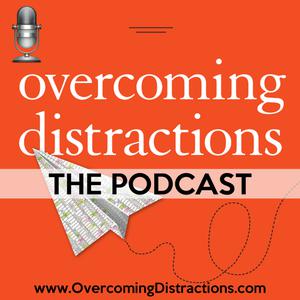 Overcoming Distractions-Thriving with ADHD, ADD
Overcoming Distractions-Thriving with ADHD, ADD
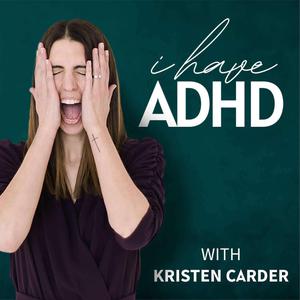 I Have ADHD Podcast
I Have ADHD Podcast
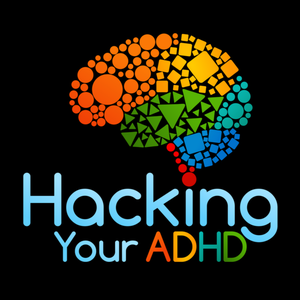 Hacking Your ADHD
Hacking Your ADHD
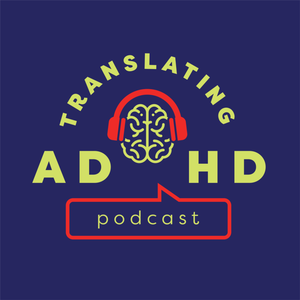 Translating ADHD
Translating ADHD
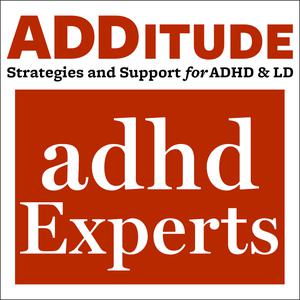 ADHD Experts Podcast
ADHD Experts Podcast
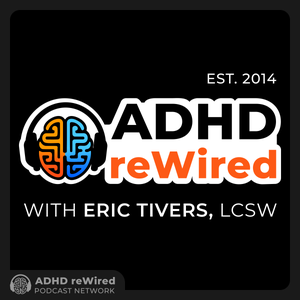 ADHD reWired
ADHD reWired